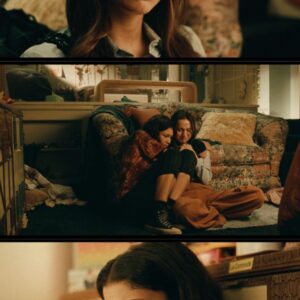In the sweltering aftermath of Hurricane Melissa’s merciless assault, where floodwaters still slosh through Kingston’s battered streets and the air hangs heavy with the scent of uprooted mango trees and damp earth, two global icons traded spotlights for spatulas. Rihanna Fenty, the Barbados-born billionaire whose voice has soundtracked heartbreak and empowerment for a generation, and her partner A$AP Rocky, the Harlem-bred rapper whose lyrical grit mirrors the island’s unyielding spirit, descended upon a makeshift kitchen in the heart of Trench Town. There, amid the hum of generators and the chatter of weary survivors, the couple donned aprons and gloves, stirring pots of steaming curry goat and rice and peas, ladling out hundreds of hot meals to families left reeling by the storm’s fury. “This ain’t about the gram or the glow-up,” Rihanna said, wiping sweat from her brow with the back of her hand as she handed a foil container to a wide-eyed elder. “It’s about filling bellies and rebuilding homes – one plate at a time.” What began as a quiet pivot from their Caribbean getaway has blossomed into a beacon of hope, reminding a devastated Jamaica that in the Caribbean’s shared soul, fame fades but family endures.
Hurricane Melissa’s landfall on October 28 was a cataclysm etched in wind-whipped fury, a Category 5 behemoth that roared ashore near Black River in St. Elizabeth Parish with 185 mph gusts – tying it for the second-strongest Atlantic storm ever recorded. The slow-crawling monster dumped up to 40 inches of rain in 48 hours, transforming the island’s verdant “breadbasket” into a sodden graveyard of splintered roofs and submerged farmlands. By Thursday, the death toll had climbed to 19, with hundreds missing amid landslides that buried entire hamlets in the Blue Mountains and flash floods that turned the Rio Cobre into a raging serpent, swallowing cars and livestock whole. Kingston, the pulsating capital of 1.2 million, dodged the worst of the eyewall but wasn’t spared: power outages plunged neighborhoods into darkness, cell towers toppled like dominoes, and internet access cratered to 30% of normal, per monitoring groups. Over 500,000 Jamaicans remained without electricity, roads barricaded by fallen palms, and markets like Coronation – the world’s largest open-air produce hub – reduced to mud-choked stalls where vendors sifted through sodden yams and bruised breadfruit.
The storm’s human toll was visceral: in Savanna-la-Mar, a coastal fishing village, waves surged 13 feet high, dragging fishing boats into backyards and salting wells with seawater. Elders like 72-year-old Ena Sinclair, her bungalow half-submerged, recounted huddling on rooftops as the sky screamed. “The wind took the zinc roof like paper; we prayed to the ancestors for mercy,” she told reporters, her voice a rasp amid the rubble. Prime Minister Andrew Holness, sleeves rolled up in mud-caked boots, toured the devastation by chopper, declaring a national emergency and estimating $15 billion in damages – a blow that could cripple an economy already limping from post-COVID scars. International aid surged: U.S. President Donald Trump’s administration airlifted supplies via C-130s from Florida, the UN dispatched 2,000 hygiene kits from Barbados depots, and British-chartered flights ferried medics and generators. Yet, on the ground, the gap between promise and plate was stark – isolated communities in St. Elizabeth cut off by washed-out bridges, where hunger gnawed as fiercely as the grief.
Enter Rihanna and Rocky, whose intervention felt like a reggae riff in a dirge. The power couple, fresh from a low-key escape in Barbados – Rihanna’s sun-kissed homeland where they often retreat to recharge amid paparazzi-free beaches – had been monitoring the forecast with growing dread. Rihanna, 37, whose Fenty empire has minted her a billionaire philanthropist, has long worn her Caribbean roots like a crown: born in Saint Michael to a Barbadian mom and Guyanese dad, she’s funneled millions through her Clara Lionel Foundation into disaster relief across the region, from Haiti’s 2010 quake to Beryl’s 2024 battering. Jamaica, with its rhythmic heartbeat echoing in her hits like “Man Down” and “Work,” holds a special pull – the island’s dancehall kings like Beenie Man and Vybz Kartel shaped her sound, and she’s headlined Reggae Sumfest twice, drawing crowds that rivaled Carnival. Rocky, 37, Rakim Athelaston Mayers, brings his own island thread: his father hails from Barbados, forging a familial tether to the archipelago that deepened when the couple welcomed sons RZA in 2022 and Riot Rose in 2023, baptizing them in Bridgetown’s sun-drenched chapels.
Word of Melissa’s intensification hit like a backbeat during their Barbados downtime – a family barbecue on the platinum coast, where Rihanna scrolled weather apps while Rocky grilled flying fish. “Ri saw the alerts and said, ‘That’s family getting hit – we can’t sit,'” a source close to the couple revealed. By October 29, as the storm’s eyewall churned toward Cuba, they chartered a private jet from Grantley Adams Airport, laden with crates of non-perishables from Fenty’s supply chain: canned ackee, powdered milk, and electrolyte packs. Touching down at Norman Manley International – the Kingston hub limping back online for relief flights – they linked arms with local partners: Food for the Poor, a Catholic charity with deep Jamaican roots, and the Jamaica Red Cross, whose volunteers had been slinging cold sandwiches from mobile units since dawn. No entourage, no red carpet – just the duo in cargo pants and tees emblazoned with “Rasta Road to Recovery,” their faces shielded by bucket hats against the relentless sun.
The heart of their effort pulsed in Trench Town, Bob Marley’s cradle turned temporary soup kitchen: a canvas tent erected in a schoolyard where floodwaters had receded just enough to salvage the playground. Rihanna, her signature Fenty Glow sunscreen the only concession to glamour, manned the rice station, scooping fluffy portions into compartmentalized trays while bantering in patois-inflected English. “Yuh wan’ extra peas, mi love? Dem good fi di blood pressure,” she teased a grandmother clutching a toddler, drawing chuckles amid the exhaustion. Rocky, sleeves rolled to his elbows, stirred vats of curry goat over open flames – a recipe cribbed from his dad’s Barbadian kitchen, spiced with scotch bonnet peppers sourced from unaffected farms in Portland Parish. “This ain’t no five-star spot, but it’s hot and it’s heart,” he quipped, plating steaming portions with callalou sides and festival bread fried golden. By midday, they’d served 500 meals, the line snaking past chain-link fences where kids kicked a makeshift soccer ball from palm fronds.
Their hands-on hustle wasn’t performative philanthropy; it was personal pulse. Rihanna knelt to chat with single mom Tanisha Brown, whose Tivoli Gardens flat lost its roof to a rogue coconut tree. “Mi lost everyting – clothes, schoolbooks, mi daughter’s doll,” Brown shared, tears mixing with the steam. Rihanna, drawing from her own single-mom grind raising three kids amid tabloid tempests, pulled her into a hug. “We’ve been there – the storm passes, but the strength stays. We’re rebuilding your roof next week.” True to word, the Clara Lionel Foundation – which has disbursed $50 million in Caribbean aid since 2016 – pledged $2 million for emergency housing, partnering with Habitat for Humanity Jamaica to erect 200 prefab units in St. Elizabeth. Rocky, whose AWGE creative collective has dabbled in streetwear with social edge, rallied his network: Quavo and Takeoff’s estate donated generators, while Fenty Beauty shipped 10,000 hygiene kits – tampons, diapers, and sanitizers tailored for flood-ravaged latrines.
The duo’s energy rippled outward, igniting a chain reaction. Local DJs spun Marley’s “One Love” from solar-powered speakers, turning the distribution line into an impromptu jam session where survivors swayed with plates in hand. Rihanna joined a circle dance, her laughter booming as Rocky freestyled a verse about “curry healing cuts deeper than cash.” Word spread via WhatsApp chains reborn on Starlink hotspots – Elon Musk’s satellite lifeline beaming connectivity to blacked-out zones – drawing volunteers from Montego Bay’s music scene: dancehall queen Spice arrived with truckloads of jerk chicken, while reggae vet Shaggy, a Jamaican fixture, helicoptered in water purifiers. By evening, the tent had morphed into a community hub: counselors from the Ministry of Health triaging trauma, kids’ coloring stations stocked with Fenty crayons, and a pop-up clinic where Rihanna’s team distributed malaria nets amid the post-storm mosquito surge.
Social media, that double-edged blade, captured the authenticity in fragments: a blurry Reel of Rocky high-fiving a fisherman, captioned “From Harlem to Harbour – we rise”; Rihanna’s Instagram Story, a raw clip of her scrubbing pots, tagged #MelissaMends with a call for donations that spiked Clara Lionel’s fund by $500,000 overnight. Fans flooded with praise – “RiRi serving realness, not just hits” – but skeptics sniped about “celeb tourism.” The couple shrugged it off; this was reclamation, not redemption. Rihanna, whose 2023 Super Bowl halftime fused Bajan soca with global beats, sees Melissa as a call to amplify: “Climate change ain’t picking islands – it’s picking on us all. We fight back with forks and fists.” Rocky, fresh from his 2025 album drop channeling Harlem’s hustle, nodded: “Art feeds the soul; this feeds the stomach. Same grind.”
As dusk painted Kingston in bruised purples, the couple lingered, stacking empty trays under lantern light. A young girl, no older than their Riot, tugged Rihanna’s hem: “Yuh food taste like home, miss.” Rihanna knelt, eyes level: “Because it is home, baby. We’re all in this pot together.” With 1,000 meals distributed and dawn promising more, Rihanna and Rocky boarded a convoy truck bound for Savanna-la-Mar – pots clanging, hearts full. In Melissa’s wake, where winds howled elegies for the lost, their quiet revolution simmers: not saviors from afar, but kin in the kitchen, stirring Jamaica toward sunrise. For an archipelago forged in storms, their plates aren’t just meals – they’re manifestos, hot off the heart.

